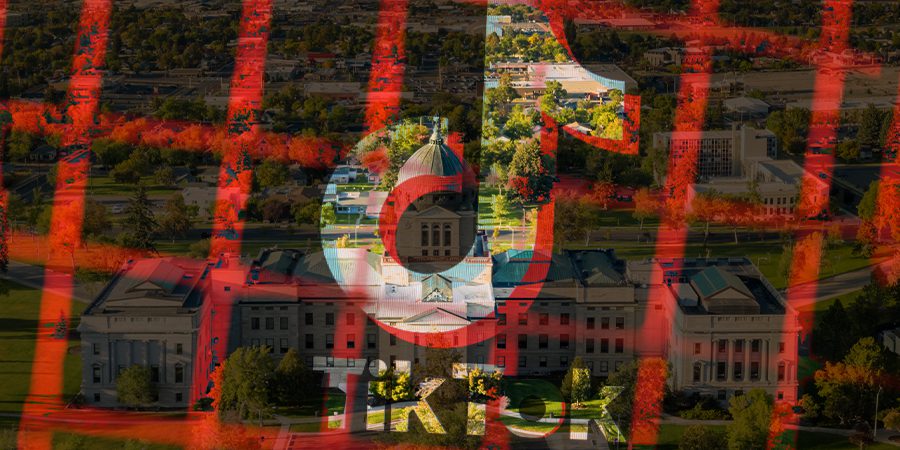In this article, we’ll look at the reasons behind the recent developments in Montana’s TikTok ban and how it has expanded to potentially target all social media apps that share data with foreign adversaries.
Key Takeaways:
- Montana governor Greg Gianforte amends the TikTok ban to address technical and legal concerns.
- The amended bill aims to protect user privacy against all foreign adversaries, not just TikTok.
- The governor removes penalties for app stores offering TikTok.
- Critics argue that the amended bill still has legal and technical challenges.
- The amended ban echoes the federal RESTRICT Act.
Addressing Technical and Legal Concerns
Montana’s governor, Greg Gianforte, is taking action to address the technical and legal concerns surrounding the state’s TikTok ban.
Initially, the bill focused solely on banning TikTok statewide.
However, critics argued that the law was unenforceable both technically and legally.
To resolve these issues, Governor Gianforte has proposed amendments to the original bill.
Instead of specifically targeting TikTok, the revised bill aims to protect Montanans’ privacy against any social media app that shares their data with foreign adversaries.
As a result, the governor has eliminated any mention of TikTok in the bill’s language.
Broadening the Scope to All Foreign Adversaries
In an effort to create a more comprehensive and enforceable law, Governor Gianforte has expanded the bill’s scope.
Rather than focusing solely on TikTok, the amended bill covers all social media apps that provide user data to foreign adversaries.
This move aims to offer broader privacy protections to the citizens of Montana.
The amended bill states that social media apps operating within Montana’s territorial jurisdiction are prohibited from sharing personal information or data with foreign adversaries or any person or entity located in a country designated as a foreign adversary.
Removing Penalties for App Stores
Governor Gianforte’s proposed amendments also address concerns regarding penalties for app stores that offer TikTok for download.
The original bill penalized app stores for making the app available in Montana.
However, the governor’s revised language removes these penalties, focusing instead on penalizing companies found guilty of sharing Montanans’ data with foreign adversaries.
Lingering Legal and Technical Challenges
Despite the governor’s efforts to address concerns, critics argue that the amended bill still faces legal and technical challenges.
David Greene, the Electronic Frontier Foundation’s civil liberties director, explains that there are numerous questions about the bill’s enforceability and its implications.
For one, enforcing the bill remains a technical challenge, as Montana does not control all internet access within the state.
Furthermore, the bill’s legality is still in question, as states cannot regulate interstate commerce.
Additionally, the bill must withstand First Amendment scrutiny, as civil rights experts contend that Montanans have the right to express themselves and access information on TikTok and other social media platforms.
Parallels with the RESTRICT Act
The amended Montana bill bears similarities to the federal RESTRICT Act proposed earlier this month.
This law aims to prohibit the use of TikTok across the whole country and provides the Secretary of Commerce with extensive authority to prohibit the use of mobile or desktop apps and other technological products from nations that are considered risks to the country’s safety, such as China, Cuba, Iran, Korea, Russia, and Venezuela.
Although Governor Gianforte’s press team did not comment on the similarities between the RESTRICT Act and his proposed amendments, it appears that the governor is adopting a similar strategy to ban TikTok and other apps that pose a threat in Montana without specifically targeting the app.
Privacy advocates like the Electronic Frontier Foundation (EFF) have criticized the RESTRICT Act’s broad language, arguing that it could apply to any tech product the government wants to target.
Furthermore, the EFF contends that the act does not prohibit mitigation efforts aimed at individual users.
Montana’s amended bill does not target individual users with mitigation efforts either. Instead, if the governor’s amendments are adopted, it will focus on companies.
However, like the RESTRICT Act, the amended Montana bill faces criticism for its potential overreach and the potential consequences it may have on the digital rights of users.
Conclusion
Governor Gianforte’s proposed amendments to Montana’s TikTok ban have expanded the bill’s scope to include all social media applications that share user data with foreign adversaries.
The revised bill aims to protect the privacy of Montanans more broadly and addresses the technical and legal concerns that critics had raised.
However, lingering questions remain about the enforceability and legality of the amended bill, as well as its implications for digital rights and interstate commerce.
Similar to the federal RESTRICT Act, both bills face opposition from privacy advocates who argue that the legislation is overly broad and potentially infringes upon citizens’ digital rights.
 Sections of this topic
Sections of this topic
















